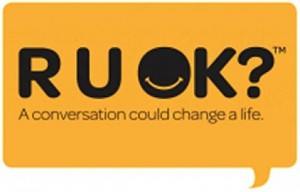 Today is ‘R U OK? Day’, a national day of action dedicated to reducing Australia’s high suicide rate. It’s a day that fits naturally with our calling as Christians to care for each other and those around us.
Today is ‘R U OK? Day’, a national day of action dedicated to reducing Australia’s high suicide rate. It’s a day that fits naturally with our calling as Christians to care for each other and those around us.
Today, all Australians are encouraged to ask family, friends and colleagues “Are you ok?”, to take responsibility for people in their lives who may be struggling and need an opportunity to say “I’m not ok” to those they love.
R U OK? Co founder and CEO, Janina Nearn, says anyone can get involved in the campaign by reaching out to a colleague, friend or loved one. “We want all Australians to take a moment to check in with someone and ask, ‘Are you ok?’ A conversation could change a life,” she says.
The Salvation Army’s Hope for Life Program is one of the partners for R UOK? Day, and aims to raise awareness about the impact of suicide in Australia. Stephanie Wilks, National Coordinator at The Salvation Army Hope for Life Suicide Prevention and Bereavement Support, believes that Christians can play an important role in caring for people and preventing situations which lead to suicide.
“I think it’s really important that the church and Christians play a role in supporting people who are going through a suicidal crisis, or who have been impacted by a suicide,” she says. Wilks points out that suicide impacts all kinds of people. “This can happen in the midst of our churches.”
The Salvation Army Suicide Prevention, through the Hope for Life program, offers training courses designed to equip people in local communities with the skills, knowledge and confidence to be there for people, to provide them with a listening ear, to give practical support and assistance and to give them a sense of comfort and hope.
Wilks says, “Our role as Christians is to support and listen to others, to help provide support and options. It’s not our role to advise and give solutions and offer clichés like ‘everything will be ok’. We need to meet people where they’re at. That’s what God calls us to do as Christians, to provide people with support and somewhere to turn.”
“After a death by suicide, sometimes people don’t know what to say and how to respond, which leads to them not saying anything at all,” observes Wilks. “The training we offer encourages people to listen and helps them to know how to respond and how to communicate in the aftermath of a suicide.” The Hope for Life team visit groups and deliver training in suicide bereavement responses, and help people know how to provide support after a suicide.
Lifeline is another organisation partnering in R U OK?Day, providing access to crisis support, suicide prevention and mental health support services through phone counselling.
Adam Payne from one1seven church in Redfern volunteered with Lifeline as a university student, an experience that revealed to him the opportunities to care for each other at a deeper level in church communities.
“The most challenging situations were those where the caller was at an immediate risk of suicide. One woman in particular called after taking a considerable number of pills, and just wanted to speak to someone whilst she was on the way out. I don’t know if the ambulance arrived in time,” he said.
“The experiences opened my eyes to some of the situations people are working through, getting a glimpse into their lives and emotions. I think Christians in their church communities, including me, often go for years relating to each other at a really shallow level emotionally. It’s really easy to do and feels very comfortable. But we are missing opportunities to challenge each other and grow together as Christians. I hate to think that there are members of our church communities who, despite regular church attendance, still feel so isolated that they have to call a telephone counselling service to find someone they’re comfortable talking to. But I am sure it happens.”
Adam concludes, “I think that part of loving our neighbours and seeing the spread of the gospel is to reach out into our communities with compassion.”
Professor Graham Martin, Suicide prevention expert and Chair of the R U OK? Scientific Advisory Group, says, “You don’t have to be an expert to support someone going through a tough time, you just need to be there, be able to listen without judgment, and take the time to follow up. It’s very common to feel alone when going through difficult times but helping someone admit they’re not ok is the first step to getting support.”
Header image: flickr_Kalexanderson
Email This Story
Why not send this to a friend?

